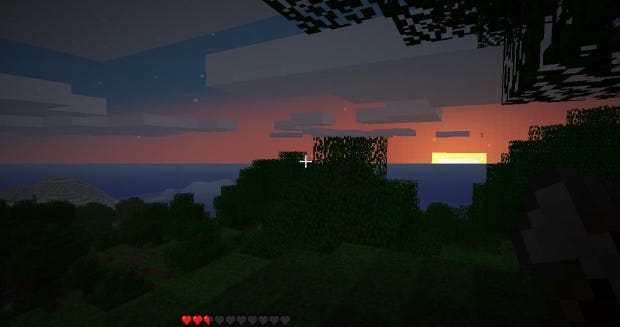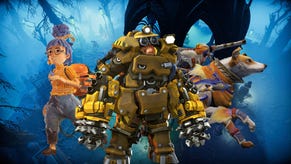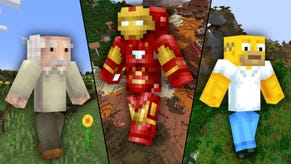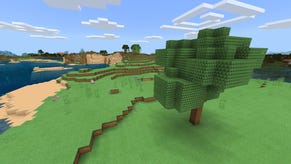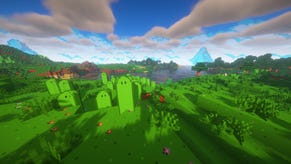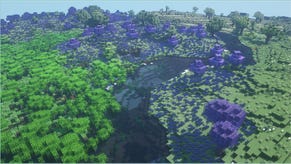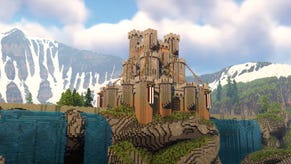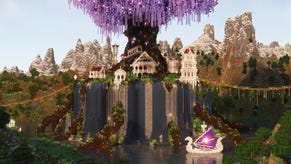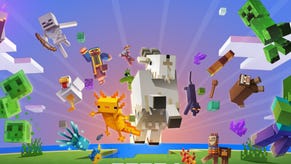Opinion: Maybe Microsoft Buying Mojang Is A Good Thing?
250,000,000,000 Cola Bottles, People
The news that Mojang is to be sold to Microsoft undoubtedly causes a lot of upset for some. Minecraft, more cultural phenomenon than game at this point, has had a breadth of appeal unlike almost any other game. And Microsoft aren’t exactly at the top of most PC games player’s Christmas card lists. It’s very easy to see the news and immediately consider it bad news. But perhaps we should pause, and wonder if this might be something worth celebrating? At least, that's what I'm trying to convince myself.
Minecraft... it’s hard to know how to capture its scale in a pithy paragraph. It began as the hardest of hardcore gaming interests, early access before there was Early Access, an openly explorable procedurally generated world in peculiarly retro-squares, with no overall purpose. Updated weekly, a dedicated group of fans would explore for the most microscopic of changes, and see how they could be exploited in the wider world. New blocks, new mobs, new anything, were greeted with the feverish joy of a cult being handed new commandments from their behatted leader. Then other people started noticing it, and word of mouth saw it spread like a wonderful virus. The wider gaming world was loving it, exploring it, creating in it, adoring it. 1:1 models of Star Trek ships were being built in it, 8 bit computers were constructed, communities started developing, building and destroying wondrous cities. And it still wasn’t halfway done. Then the non-specialist world found it, and it became a mobile hit, a console hit, a thing people who had never played even Tetris started talking about in coffee shops and on the bus. And then it went still bigger! It stepped outside of the gaming world entirely, became a teaching tool, a means of spreading knowledge, a children’s educational game, and on and on and on. Adaptations of it appear in Lego, in papercraft, in cuddly toys sold in high street toy shops. It is ubiquitous.
All this, from a game mostly developed in one guy’s mum’s basement. Markus “Notch” Persson’s life is irreversibly changed, from struggling Wurm Online developer to one of the richest men in videogames, in a frighteningly short time. Mojang, his fledgling company in a very modest Swedish apartment building, has been trying to operate on the scale of a massive corporation, dealing with hundreds of millions of dollars. Notch himself has been trying to make another game ever since, and failing. No one could have predicted Minecraft and Mojang’s success, least of all the people who started it. Where we are now was no one’s intention, so to have any expectations of anyone involved at this stage is, I would argue, wholly unfair.
However, when people buy a game, they certainly do have expectations. What they should be, and how far-reaching they should aspire to, are the subjects for a dozen other editorials, so let’s simplify somewhat here. People buying Minecraft, because of the history of the game, expect to be buying a product that will continue to evolve, be added to, and change over time. However, they don’t have the right to demand that, any more than they would have the right to demand a jumper they bought from Primark should continue to have new patterns sewn into the sleeves for as long as they wear it. Mojang, if they wish, could cease all further development on Minecraft, and walk off into the sunset, and no one would have been treated unfairly. Expectations may not be met, and that would unquestionably leave some people hurt, frustrated, or angry, but this wouldn’t change the reality of Mojang’s rights.
And so it is that Mojang and Persson are entirely entitled to sell their company to Microsoft under any conditions they wish. We can put that aside, and instead focus not on should they have because that’s not a question we get to ask, but I suggest, what would we have done?
Let’s play that game. You might be a librarian, or a retail assistant at Best Buy, or an accountant, or the person who paints kids’ faces at fairs, or managing director of a box labelling company, or a secondary school teacher – I’m not sure, because I can’t quite see you. But which of you, which job would it be, where someone coming along and saying, “We would like to give you 2.5 billion dollars,” would be firmly shown the door? I would speculate it’s NO ONE EVER AT ALL.
$2.5 billion is so much money that on reading it at the start of this sentence, your brain instead pictured flowers. $2.5bn is so much money that it’s utterly impossible to imagine having it. When we play that game of what we’d do if we had a million (we’ll talk in dollars for ease), or ten million, we start to disappear off into wonderful fantasies of the madcap combination of generosity and selfishness we’d embark upon. The house we’d buy, the friends’ lives we’d change, the holiday we’d go on, the charities we’d give to, the cars we’d buy our mums, the room we’d dedicate just to jelly beans, the underwater swimming pool that would link our three mansions... At those scales of fortunes, our imaginations run wild with the freedom it would afford us. $10 million is 0.4% of $2.5bn. IT’S NOT EVEN HALF A PERCENT.
I swear, it’s so ridiculously difficult to get one’s head around this figure. Even broken down into something as stupid as how many half-million dollar homes it would buy, it still defies belief that the answer is FIVE THOUSAND HOMES. A small town of luxury houses.
So no matter the initial fury one might feel at seeing Mojang sold to nasty old Mr Microsoft, just imagine someone offering you that cheque, and not even demanding your first born.
Okay, so if we can empathise to the point of saying - it would have been rock-eatingly bonkers to refuse so much money, for something that’s not morally wrong – can we take a step further and be hopeful?
Microsoft do not have an impeccable history with development companies they’ve bought. It’s pretty tricky not to think of Rare, or FASA Corporation, or the demise of Microsoft Flight moments after launch, or whatever springs to mind. But it’s also true that they bought Lionhead who are still going, and Twisted Pixel Games, Turn 10 Studios, Press Play, Black Tusk... It’s possible to be owned by Microsoft, and not immediately destroyed. It’s possible, and believe me I don’t like typing it, that Microsoft could be good for Mojang. It’s possible, okay.
The news that the original three Mojangers are leaving might also give cause for immediate concern. Are they not the lynchpin behind Minecraft? Well, they certainly were at some point, but Minecraft's final release came out nearly three years ago, it's alpha available in 2009, and very few developers who worked on a game are still even vaguely attached to it five years after it went on sale. It might have a negative effect on the direction continued development of Minecraft goes in, or it might be the best thing that ever happened to the series, allowing fresh minds and fantastic new initiatives to come in that will delight players worldwide. We have no way of knowing. What we can know is that it’s absolutely acceptable for developers to want to move on, to make new games, or to build castles so tall they reach the sky. We cannot begrudge that.
Microsoft are assuring the confused world that development will continue on rival platforms like the PS3 and PS4, and Android and iOS devices. In a gaming world where mindless, spiteful exclusivity feels like the norm, it’s rational that people were worried they might not. However, even Microsoft couldn’t and wouldn’t be so stupid as to cut off such massive revenue streams, even if it goes against their usual grain. Making Minecraft Xbox ONE exclusive might sound like the sort of thing they’d do – because it is the sort of thing they’d do – but in this case the horse is already so long bolted they couldn’t even try. (Which isn’t to say they won’t announce Minecraft 2 as an Xbox exclusive, because as I’ve said, they are that spitefully mindless.)
They’ve also said they’ll continue MineCon, and we can safely assume they’ll also continue all the other massively profitable ventures associated with the product. If I saw a Microsoft executive informing me how much they just love the game, I’d sensibly scoff at their face, but while it causes money to rain out of the sky you can be assured it’s their goal to keep it that way.
And this frees those brilliant creative minds from the shackle that Minecraft has unquestionably become. From an outsider’s perspective, I speculate that it looks like Notch is perhaps in the throes of some form of developer’s block. He’s made some fun jam-based games, but longer projects have eluded him, and with the shadow of Minecraft looming over, it’s no surprise. To be set free from that responsibility, and indeed from the astonishingly vile cruelty that comes his way every time a small pocket of the game’s players don’t like a decision, seems like exactly what a gaming fan would want: a chance to see the mind behind Minecraft set free to create something new for them to play.
Have I convinced anyone? Have I convinced myself? I’m quite certain that if... (hmmm, how evil am I willing to admit to? Hell, let’s go all the way) ...Rupert Murdoch were to offer me my share of $2.5bn for RPS, I’d be staring guiltily at you all from my diamond yacht before the ink was dry on the cheque. It’s money on a scale that you simply cannot turn down – just think, you could give 90% of it away to world-changing causes, and still live like an emperor on the interest of the remainder. Is it good overall? For Mojang? Undeniably yes – they’re rich now. For Notch? Without question – he’s free now. For Minecraft? No, I’ve not convinced myself there. But I figure at least in the short term, it’s fine. And, well, I’ve had five years’ of pleasure from the £10 I spent on that game – I’m pretty convinced I already got my money’s worth.
